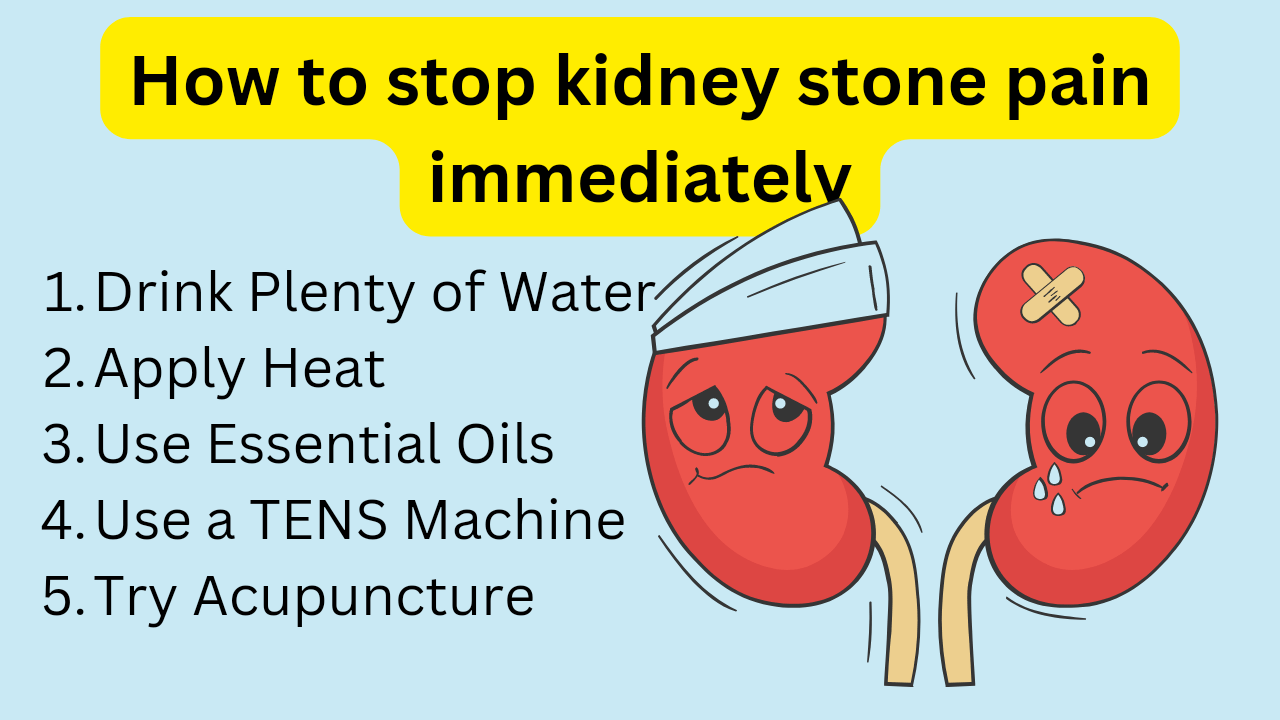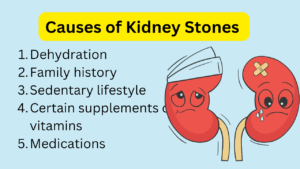Here you will learn about “What are the causes of kidney stone? Types of kidney stone. How to stop kidney stone pain immediately”.
Kidney stones are solid, mineral deposits that form in the kidneys and can cause severe pain and discomfort when they pass through the urinary tract.
There are different types of kidney stones, each with its own unique set of causes and risk factors.
Types of Kidney Stones
There are four types of kidney stones, which are classified based on their chemical composition.
- Calcium Stones: These are the most common type of kidney stones, accounting for about 80% of all cases. They are composed primarily of calcium oxalate, but can also contain other compounds like calcium phosphate and uric acid.
- Uric Acid Stones: Uric acid stones form when the urine is too acidic and contains high levels of uric acid, which is a waste product that is normally excreted in the urine. These stones can be caused by certain medical conditions or diets that are high in purines.
- Cystine Stones: Cystine stones are very rare and are caused by a genetic disorder that affects the way the body processes cystine, an amino acid. These stones can be very difficult to treat and may require surgery.
- Struvite Stones: Struvite stones are made up of magnesium, ammonium, and phosphate. They are typically caused by urinary tract infections (UTIs) and can grow very large, leading to kidney damage or obstruction.
What are the Causes of Kidney Stones?
Kidney stones form when the urine contains too much of certain substances, such as calcium, oxalate, and uric acid. Other factors that can increase the risk of developing kidney stones are following.
- Dehydration: When the body doesn’t have enough fluids to produce urine, the urine becomes concentrated and can lead to the formation of crystals, which can eventually develop into stones.
- Diet: A diet high in salt, sugar, and animal protein can increase the risk of kidney stones. Foods that are high in oxalate, such as spinach, beets, and chocolate, can also contribute to stone formation.
- Family history: If someone in your family has a history of kidney stones, you may be more likely to develop them as well.
- Medications: Some medications, such as diuretics, calcium-based antacids, and certain antibiotics, can increase the risk of kidney stones.
- Obesity: Being overweight or obese can increase the risk of kidney stones.
- Sedentary lifestyle: Lack of physical activity can contribute to the formation of kidney stones.
- Inflammatory bowel disease (IBD): IBD, such as Crohn’s disease or ulcerative colitis, can increase the risk of kidney stones due to changes in the digestive tract that affect the absorption of nutrients and increase the amount of oxalate in the urine.
- Certain supplements or vitamins: High doses of vitamin C or vitamin D supplements can increase the risk of kidney stones.
- Certain surgeries or medical procedures: Some surgeries or medical procedures that involve the urinary tract can increase the risk of kidney stones, such as gastric bypass surgery, bowel surgery, and cystoscopy.
- Urinary tract abnormalities: Abnormalities in the urinary tract, such as narrow ureters, can make it difficult for urine to pass through and increase the risk of stone formation.
How to stop kidney stone pain immediately?
Here are some tips on how to stop kidney stone pain immediately:
- Try Gentle Exercise: Gentle exercise, such as walking or stretching, can help reduce the pain associated with kidney stones. It can also help improve blood flow and reduce inflammation.
- Drink Plenty of Water: Drinking plenty of water can help flush out the kidney stone and reduce the pain. Aim for at least eight glasses of water a day. You can also add lemon to your water, as it contains citric acid, which can help break down the stone.
- Apply Heat: Placing a heating pad or hot water bottle on the affected area can help relieve the pain. The heat can help relax the muscles and increase blood flow to the area, which can help reduce inflammation.
- Try Herbal Remedies: Certain herbal remedies, such as chanca piedra or nettle leaf, have been shown to help break down kidney stones and reduce pain. However, it is important to speak with your healthcare provider before trying any herbal remedies.
- Take Over-the-Counter Pain Relievers: Over-the-counter pain relievers, such as ibuprofen or acetaminophen, can help reduce the pain associated with kidney stones. However, it is important to speak with your healthcare provider before taking any medication.
- Use Essential Oils: Certain essential oils, such as peppermint or lavender, can help reduce the pain associated with kidney stones. You can add a few drops of the essential oil to a carrier oil, such as coconut or olive oil, and massage the affected area.
- Try Acupuncture: Acupuncture is a traditional Chinese medicine technique that involves inserting thin needles into specific points in the body. It has been shown to help reduce the pain associated with kidney stones.
- Use a TENS Machine: A TENS machine is a device that uses electrical impulses to stimulate the nerves and reduce pain. You can place the electrodes on the affected area and adjust the settings to your liking.
How to prevent calcium oxalate kidney stones?
Calcium oxalate kidney stones form when there is an excessive amount of calcium and oxalate in the urine, and the urine becomes concentrated.
Normally, the urine is able to dissolve the small amounts of calcium and oxalate that are present. However, if the urine becomes too concentrated, the calcium and oxalate can bind together and form crystals.
Over time, these crystals can grow larger and form solid masses, which can become kidney stones. Kidney stones can range in size from a small grain of sand to a large stone that can fill the entire renal pelvis and block the flow of urine.
Following are the factors that can increase the risk of calcium oxalate kidney stone.
- High oxalate intake: Avoid Consuming foods that are high in oxalate, such as spinach, rhubarb, and nuts, can increase the amount of oxalate in the urine.
- Rehydration: When the body doesn’t have enough water, the urine becomes more concentrated, making it easier for crystals to form. Therefore drink plenty of water.
- Certain medications: Certain medications, such as diuretics and antacids, can increase the risk of kidney stone formation. Consult your doctor before using such medicine.
- Digestive disorders: Certain digestive disorders, such as Crohn’s disease and ulcerative colitis, can increase the amount of oxalate in the urine.
- Family history: If a family member has a history of kidney stones, you may be more likely to develop them as well.
Here’s the video of ” How to stop kidney stone pain immediately”.

